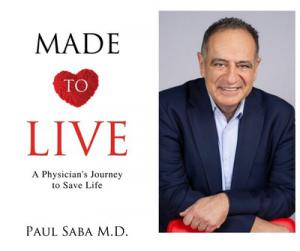If women were given financial, educational, work, social and medical support, most would probably keep their babies. It’s a question of fairness and equity.
— Dr. Paul Saba
MONTREAL, QUEBEC , CANADA , December 25, 2023 /EINPresswire.com/ — “For unto us a child is born, unto us a son is given: … and his name shall be called Wonderful, Counseller, The mighty God, The everlasting Father, The Prince of Peace.” Isaiah 9:6, Bible
For you formed my inward parts;
you knitted me together in my mother’s womb.
…for I am fearfully and wonderfully made. Isaiah 139: verses 13,14 Bible (ESV)
This Christmas season is the time to pause, and reflect on the birth of Jesus Christ. Jesus was born to a woman who was unwed. In addition, she was poor. 2000 years ago an unwed mother was considered to be a social outcast. Joseph, to whom she was engaged to was not the biological father of Jesus. Furthermore he had second thoughts about marrying Mary who was Jesus mother. Nevertheless Joseph supported the birth of the future baby. The extreme poverty of the future parents of Jesus is corroborated by the biblical account that Jesus was born in a stable where animals were kept.
During Roman times when Jesus was born, it was not uncommon for unwanted babies to be given up for adoption, sold into slavery, aborted or even left to die.
https://www.newworldencyclopedia.org/entry/Abortion
Similarly today, some woman who are faced with challenges may question whether to keep their future babies.
A 2005 study published by the Guttmacher Institute, asked American women to list the different reasons they decided to abort their pre-born baby. Most provided more than one response. 73 % listed financial concerns whether married or single. 74% we’re concerned that having a baby would significantly change their life including loss of education and career opportunities. Almost half had relationship challenges. 14% of their partners wanted the abortion. 13% in the survey expressed concerns about the possible health of the future baby. 1% we’re concerned about their own health. https://www.guttmacher.org/sites/default/files/pdfs/pubs/psrh/full/3711005.pdf
Dr. Saba states the following: “One of my patients, a single woman in her 30s with a low paying job discovered she was pregnant. Some of her friends encouraged her to abort because of her limited financial resources and another young child she was already caring for. Despite financial pressures, the father’s refusal to help and risk of losing the relationship, she decided to continue her pregnancy and recently delivered a beautiful daughter who is her joy.”
In the book ” Made to Live” madetolive.com, the story of Dr. Saba’s daughter Jessica highlights the challenges parents face bringing into the world children with possible health disabilities. Prior to her birth at 20 and 24 weeks, ultrasounds demonstrated that Jessica had a severe cardiac abnormality. Dr. Saba and his wife Marisa were also informed that Jessica was probably a Down’s baby. They were encouraged to consider abortion which they refused. Marisa stated that if God allowed them a child with a disability, He would also equip them to take care of their child. She was even asked how aggressively the medical team should intervene after the birth of Jessica if there were problems regarding her survival. His wife courageously answered “I’ve done everything to bring the baby to this point, I expect you to do everything to save my baby.” madetolive.com
Because of amazing medical care and support at the Montreal Children’s hospital, today Jessica is a beautiful, bright, and articulate 14 year old teenager, according to Dr. Saba.
Abortion goes against the Judeo-Christian ethics of medicine based on the Good Samaritan model. This has been the bedrock of modern medicine for centuries. The Good Samaritan model ensures medical care and support for life no matter what the cost. This was enshrined in the teachings of Sir William Osler who is considered as the father of modern medicine and medical ethics. He was a Professor of Medicine at McGill University and helped found Johns Hopkins Medical School. Dr. Osler’s medical philosophy is detailed in Dr. Saba’s book “Made to Live.”
One of the arguments utilized by abortion advocates are the financial costs that poorer women cannot afford during or after birthing their babies and the extra economic costs to governments.
According to a 2015 US congressional policy report, over 19 million black babies had been aborted since the Roe v. Wade decision in 1973 with the majority of abortion facilities within minority communities contributing to the high rate that black women obtain abortions. https://www.congress.gov/115/meeting/house/106562/witnesses/HHRG-115-JU10-Wstate-ParkerS-20171101-SD001.pdf
A study published in 2003 estimated that in the United States, abortions would save $4 for every dollar spent on low-income women for prenatal care, delivery services, and medical assistance over a two year period. https://pubmed.ncbi.nlm.nih.gov/12667113/.
Dr. Saba states: “Economic savings should not be used as an argument to prevent pregnant moms who want their children from giving birth. Furthermore, mothers who are in financial distress should not feel pressured to abort their offspring. Companies willing to pay for abortion services including transportation costs, should also consider paying for birth, parental leave and child care expenses for mothers wanting to keep their babies. These same companies should also provide fair and reasonable salaries so that mothers can adequately provide for their families. Governments must also step up and help. Women wanting to birth and care for their babies and children would benefit from more medical, psychological, financial(including career opportunities), educational and social support. They should and must be treated fairly and equitably.”
It has been estimated that to date over 63 million babies lives have been lost in the United States in the 50 years since the Roe v Wade decision. https://nrlchapters.org/saus2022report/ If the same percentage of babies is calculated using the American experience, approximately 1.5 billion children lives have been lost worldwide. The long term economic, social and healthcare costs of lost lives include a depleted workforce of doctors , nurses, teachers and other essential workers who could have contributed to a more robust and sustainable society.
According to Dr. Saba, “We need to value babies, children and future adults because as my daughter Jessica inscribed above the family portrait she painted at at age seven, we are “Made to Live.”
Dr. Paul Saba
+1 515-886-3447
email us here
madetolive.com
Visit us on social media:
Facebook
LinkedIn
Instagram
TikTok
Made to Live Trailer
![]()
Originally published at https://www.einpresswire.com/article/677240396/dr-paul-saba-author-and-physician-this-christmas-season-support-women-who-want-to-keep-their-babies




